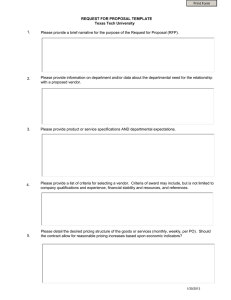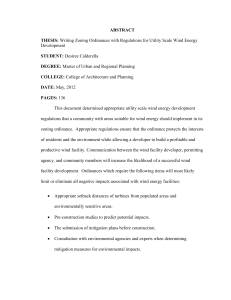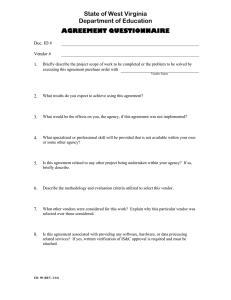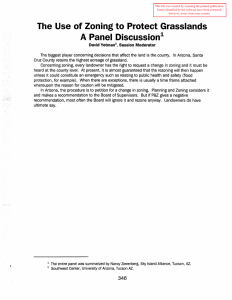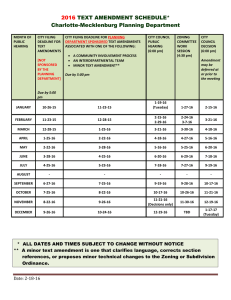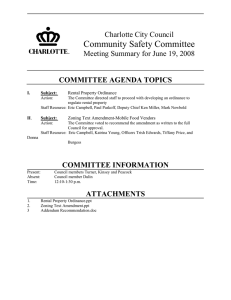MOBILE FOOD VENDORS CITIZEN ADVISORY GROUP MEETING JANUARY 30, 2014
advertisement
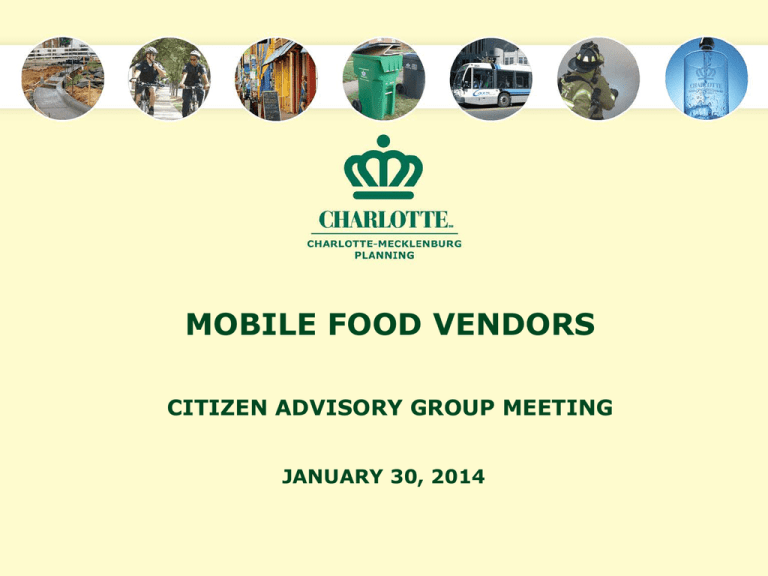
MOBILE FOOD VENDORS CITIZEN ADVISORY GROUP MEETING JANUARY 30, 2014 AGENDA • • • • • Welcome & Introductions Citizen Advisory Group Role Goal and Purpose Project Background Issues And Concerns A. Process B. Other • Feedback • Next Steps January 30, 2014 PROCESS CAG Membership – Business Owners, Community Leaders, Residents, City and County Departments (Planning, Neighborhood and Business Services, Health and Charlotte Mecklenburg Police) and other interested parties. PURPOSE PURPOSE: Through a citizen advisory group process, Planning staff will explore current mobile food vendor regulations and possibly modify the regulations that allow the use in Charlotte. Text Amendment Process Citizen Advisory Group Role of Citizen Advisory Group Members: • Help identify issues and concerns • Help identify possible solutions • Provide feedback on staff recommendations • Attend and participate in meetings Role of Staff: • Educate and inform • Help identify issues and concerns • Help identify possible solutions • Develop staff recommendations • Listen to Citizen Advisory Group Members issues and concerns • Present staff recommendations and bring forward any outstanding issues to City Council Text Amendment Process Citizen Advisory Group Role of Planning Commission • A member is assigned to attend Citizen Advisory Group meetings and reports back their observations to the full Commission • Members of the Planning Commission’s Zoning Committee attend public hearing on text amendment • Members of the Zoning Committee meet and make recommendation that is forwarded to the City Council • Members of the Zoning Committee attend public hearing where decision is made by City Council BACKGROUND PROJECT BACKGROUND • In 2006 mobile food vendors and City Code Enforcement staff raised concerns about current standards regulating the use. • Issues identified included: – Vendor could locate at a site for up to 12 times a year for no longer than five day periods at a time. Each permit required two inspections – one to locate on site and one to verify use was removed from the site. – Inspection resources required to enforce the regulations were strained. – Repacking and moving every five days was burdensome and costly for the vendors. PROJECT BACKGROUND Issues: • There was no definition of a mobile food vendor in the Zoning Ordinance. • Staff also received complaints from CMPD and community groups about trash, traffic, safety (robbery targets), noise, drinking, loitering and interference with adjacent businesses that was spilling from mobile food vendor operations. • Before recommending any changes to the Zoning Ordinance a stakeholders group was formed in August 2007 to discuss these issues. PROJECT BACKGROUND • The group was comprised of mobile food vendors, neighborhood leaders, citizens, and staff from Neighborhood Development Code Enforcement, CMPD, and Mecklenburg County Environmental Health. The stakeholders held three meetings between August 2007 and October 2007. • At the conclusion of a stakeholder process, staff filed the text amendment with proposed changes. • The City Council’s Community Safety Committee met twice to discuss the petition and to clarify issues raised at the July 28 public hearing on the proposed changes. The Committee voted unanimously on September 29, 2008 to recommend the zoning text amendment to the full Council for approval. PROJECT BACKGROUND • City Council approved the regulations for mobile food vendors on November 24, 2008. • There is a desire to have the use clustered in some locations • Department has received requests to revisit the regulations for mobile food vendors Goals GOAL: Review current regulations and consider revisions to Zoning Ordinance that regulates mobile food vendors. CURRENT REGULATIONS Code Section 12.510 City of Charlotte Zoning Ordinance Definition Mobile Food Vending Service A service establishment operated from a licensed and moveable vehicle that vends or sells food and/or drink processed or prepared on-site to walk-up customers. Current Regulations Section 12.510. Mobile food vending services. 1. Not allowed in required setback, sight distance triangle, or required buffer. 2. Requires a zoning use permit. Maximum duration - 30 days renewable twice. Maximum time period 90 days per year. 3. Proof of property owner or designated agent permission 4. If issued a notice of violation at the location operator not eligible to renew at that location for the rest of the year. 5. Trash receptacles must be provided Current Regulation 6. Vendor must remove trash at the end of each business day. 7. Hours of operation are from 8:00 a.m. until 9:00 p.m. 8. One parking space per 250 square feet of the mobile food vending unit required. Additional parking may be required. 9. Not excluded from other requirements 10. No access from a Class V (collector), Class VI, (local), or Class VI-L (cul-de-sac) street. Current Regulation 11. A minimum 400’ separation from other mobile food vendor and a minimum 400’ separation to a residential use. 12. A zoning use placard must be posted 13. All applicable local and state codes shall be met. 14. Exemptions for a. Special events b. Non-profit, fundraising events of 5 days or less Focus Areas Locations Secondary Impacts Mobile Food Vendors Proximity to Neighborhoods Operating Hours Discussion Break out Group ● Locations 1. Should there be restrictions on where a mobile food vendor should be allowed to locate? Why or Why not? ● Operating Hours 1. Should there be limits on the time period that a mobile food vendor can be allowed to stay open? 2. How long should a permit be valid for a location? DISCUSSION Cont. • Separation From Neighborhoods 1. What should be the separation distance requirement for a mobile food vendor from a residential use? • Secondary Impacts 1. Are there any secondary impacts from mobile food vendors? If so what are the impact(s)? Next Steps Planning Department – Draft a text amendment to the Zoning Ordinance to modify requirements for mobile food vendors. • CAG Meetings • March 10 , 2014 • March, 2014 • April, 2014 • May, 2014 • June, 2014 Feedback and Discussion Draft Recommendation Final Recommendations City Council Public Hearing City Council Decision
